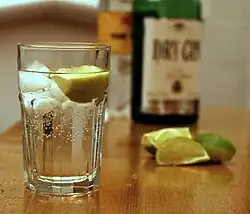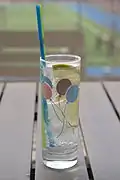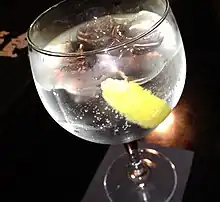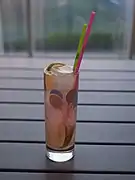Gin and tonic
A gin and tonic is a highball cocktail made with gin and tonic water poured over a large amount of ice.[1] The ratio of gin to tonic varies according to taste, strength of the gin, other drink mixers being added, etc., with most recipes calling for a ratio between 1:1 and 1:3. It is usually garnished with a slice or wedge of lime. To preserve effervescence, the tonic can be poured down a bar spoon.[2] The ice cools the gin, dulling the effect of the alcohol in the mouth and making the drink more pleasant and refreshing to taste.[3]
| Cocktail | |
|---|---|
 Gin and tonic with lime wedge | |
| Type | Highball |
| Base spirit | |
| Served | Poured over cubes of ices ("on the rocks") |
| Standard garnish | A slice of lime |
| Standard drinkware | |
| Commonly used ingredients | Gin and tonic water, according to taste |
| Preparation | In a glass filled with ice cubes, add gin and tonic. |
It is commonly referred to as a G and T in the UK, US, Canada, Australia, New Zealand and Ireland.[4] In some parts of the world (e.g., in Germany, Italy, France, Japan, the Netherlands, Spain, Turkey), it is called a gin tonic (Japanese: ジン・トニック, Hepburn: jin tonikku). It is also referred to as ginto in Belgium and the Netherlands, and as GT in the Nordics.
Garnish and serving
Gin and tonic is traditionally garnished with a slice or wedge of lime, often slightly squeezed into the drink before being placed in the glass. In most parts of the world, lime remains the only usual garnish; however, lemon is often used as an alternative fruit. In the United Kingdom, the use of both lemon and lime together is known as an "Evans".[5] Although the origins of the use of lemons are unknown, their use dates back at least as far as the late 1930s.[6] The use of lemon or lime is a debated issue[7] – some leading brands, such as Gordon's,[8] Tanqueray,[9] and Bombay Sapphire,[10] recommend the use of lime in their gin.
The use of a balloon glass for serving gin has become popular, possibly through promotion by the Bombay Sapphire gin brand.[11] The use of such a glass, with plenty of ice and a garnish tailored to the flavours of the gin, is sometimes said to allow the aromas of the drink to gather at its opening for the drinker to more easily appreciate.[12]
The use of assorted fruits, herbs, and vegetables, as garnish (reflecting the botanicals of the individual gin), is increasingly popular.[13] Besides the classic lime wheel or wedge, alternative garnishes can include orange peel, star anise, thyme-elderflower, a slice of ginger, pink grapefruit, rosemary, cucumber, mint, black peppercorns, strawberry and basil, strawberry syrup,[14][15] or chillies.[1] Fruits such as kumquats or other citrus or cucumber[16] can be included.[17]
History
The cocktail was created by officers of the Presidency armies, the military force of the East India Company which operated on the Indian subcontinent. In the India subcontinent and other tropical regions, malaria was a persistent problem for Europeans, and in the 18th century, Scottish doctor George Cleghorn studied how quinine, a traditional cure for malaria, could be used to prevent the disease.[18][19] The quinine was drunk in tonic water but the bitter taste was unpleasant.[19] Presidency armies officers in India in the early 19th century took to adding a mixture of water, sugar, lime and gin to the quinine in order to make the drink more palatable, and thus the gin and tonic cocktail was born.[20] The officers were already given a gin ration as part of their rations, and the sweet concoction made sense.[21] Since it is no longer used as an antimalarial, tonic water today contains much less quinine, is usually sweetened, and is consequently much less bitter.[22]
A 2004 study found that after 12 hours, "considerable quantities (500 to 1,000 ml) of tonic water may, for a short period of time, lead to quinine plasma levels at the lower limit of therapeutic efficacy and may, in fact, cause transitory suppression of parasites". This method of consumption of quinine was impractical for malaria prophylaxis, as the amount of drug needed "cannot be maintained with even large amounts of tonic". The authors concluded that it is not an effective form of treatment for malaria.[23]
Variations
Mixers can include lime juice,[24] lemon juice,[25] orange juice and spiced simple syrup,[26] grenadine,[27] tea,[28] etc.
A gin and tonic can also be mixed with a sorbet.[29]
Some gin-and-tonic inspired drinks also have champagne (e.g. the Parisian), vermouth and Campari (e.g. the Negroni Sbagliato),[30] vermouth and bitters (e.g. the Posh G&T), super smokey whiskey (e.g. the Ol' Smokey), peach liqueur and grapefruit bitters (e.g. the Tonic Delight), mint bitters, and chocolate liqueur (e.g. the Guilty Pleasure), etc.[31]
In popular culture
The trans-galactic nature of the gin and tonic is imagined in Douglas Adams' novel The Restaurant at the End of the Universe, which describes how "85% of all known worlds in the Galaxy, be they primitive or highly advanced, have invented a drink called jynnan tonnyx, or gee-N'N-T'N-ix, or jinond-o-nicks, or any one of a thousand or more variations on the same phonetic theme. The drinks themselves are not the same, and vary between the Sivolvian 'chinanto/mnigs' which is ordinary water served at slightly above room temperature, and the Gagrakackan 'tzjin-anthony-ks' which kills cows at a hundred paces; and in fact the one common factor between all of them, beyond the fact that the names sound the same, is that they were all invented and named before the worlds concerned made contact with any other worlds."
James Bond specifies a recipe for a gin and tonic while in Kingston, Jamaica, in the book Dr. No. Unusually, it involves the juice of a whole lime.[32]
In the BBC1 and Amazon Prime television series Fleabag, Fleabag and the Priest enjoy canned G&Ts from Marks and Spencer. The store reported a 24% increase in sales after the episodes aired.[33]
Founded in 2010, International Gin & Tonic Day is celebrated worldwide on 19 October.[34]
Images
 Gin and tonic made with Bombay Sapphire London Dry Gin and Schweppes Indian Tonic, garnished with slices of lime
Gin and tonic made with Bombay Sapphire London Dry Gin and Schweppes Indian Tonic, garnished with slices of lime A gin and tonic with ice and lemon wedge
A gin and tonic with ice and lemon wedge
 A Spanish gin tonic served in a balloon glass
A Spanish gin tonic served in a balloon glass
See also
- Dubonnet, another drink invented to encourage European colonial soldiers in tropical climates to take quinine
- Lillet, an aperitif wine
- Pink Gin, Plymouth gin mixed with Angostura bitters
- Quinquina, a quinine-containing beverage sometimes used as a mixer with gin
- Beton, a cocktail made by mixing tonic water with Becherovka, a Czech bitters[35]
References
- "This is how you make the perfect G&T". Good Housekeeping. 31 July 2017.
- Bombay Sapphire Global (18 July 2017). "03 Ultimate G&T 1". YouTube. Archived from the original on 11 December 2021.
- "7 mistakes that are ruining your gin and tonic". Good Housekeeping. 5 June 2017.
- HeapsGoodGin (5 September 2022). "Ginto, G & T, Gin Tonic. How Countries Around The World Define A G & T". heapsgoodgin.com.au. Retrieved 8 February 2023.
- Knoll, A & Smith, D (2013). The Craft of Gin. Hayward: White Mule Press. p.69. ISBN 978-0-983-63896-4.
- "Gin and Tonic as served at the Shepheard's in Cairo" Gilbey's Gin advert from Punch magazine, April 1938
- Simonson, Robert; DeSantis, Alicia (22 May 2013). "How Would You Like Your Drink?". New York Times.
- "Gordon's Perfect G&T". Gordon's. Retrieved 1 January 2019.
- "Tanqueray London Dry Gin & Tonic". Tanqueray. Retrieved 1 January 2019.
- "Bombay Sapphire and Tonic Recipe". Bombay Sapphire. Retrieved 1 January 2019.
- "Bombay Pushes Gin-trend with glassware". thedrinksbusiness.com. Retrieved 9 January 2012.
- "World Gin Day Gin Tonica Tasting". SummerFruitCup.com. 8 June 2012. Retrieved 6 July 2012.
- "The 8 Great Gins of London Gin Club". Archived from the original on 21 September 2013. Retrieved 15 August 2012.
- "Strawberry Gin and Tonic • strawberry cocktail • a farmgirl's dabbles". 2 July 2019.
- "Blushing strawberry gin and tonic". 24 April 2020.
- Recipes, words: VinePair (12 September 2016). "The GT&C [RECIPE]". VinePair.
- "All-Natural Gin and Tonic | Minimalist Baker Recipes". 4 April 2015.
- The Malaria Site. Retrieved 18 August 2019.
- "From Charles Mackintosh's waterproof to Dolly the sheep: 43 innovations Scotland has given the world". The independent. 30 December 2016.
- Tonic water: sweet, bitter medicine. Retrieved 30 December 2009.
- Raustiala, Kal (28 August 2013). "Gin and tonic kept the British Empire healthy: The drink's quinine powder was vital for stopping the spread of malaria". Slate.com. Retrieved 25 June 2014.
- Burkhart, Jeff (2010). "Do you know where your New Year's cocktail comes from?". National Geographic Assignment. Archived from the original on 24 April 2011. Retrieved 1 December 2010.
- C. G. Meyer; et al. (December 2004). "Editorial: Gin tonic revisited". Trop Med Int Health. 9 (12): 1239–1240. doi:10.1111/j.1365-3156.2004.01357.x. PMID 15598254.
- Cecchini, Toby. "Gin and Tonic Recipe". NYT Cooking.
- Migliarini, recipe: Natalie. "The Navy-Strength Botanical Gin & Tonic Recipe". VinePair.
- Migliarini, recipe: Natalie. "Winter Gin & Tonic Recipe". VinePair.
- Migliarini, recipe: Natalie. "The Pomegranate Gin & Tonic Recipe". VinePair.
- Saladino, recipe: Emily. "The Breakfast Tonic Recipe". VinePair.
- Migliarini, recipe: Natalie. "The Gin And Tonic Sorbet Recipe". VinePair.
- Torner, Timo (9 December 2021). "Negroni Sbagliato". Cocktail Society. Retrieved 29 September 2022.
- "10 gin & tonics with a twist". BBC Good Food.
- "The James Bond Gin & Tonic". tjbd.co.uk. Retrieved 11 August 2012.
- "Fleabag sparks 24% rise in M&S gin and tonic sales". Radio Times.
- "International Gin & Tonic Day - 10/19/2013". liquor.com. Archived from the original on 20 October 2013. Retrieved 19 October 2013.
- "Not Sure What to Do with Becherovka? Try This". Liquor.com. Retrieved 8 April 2020.